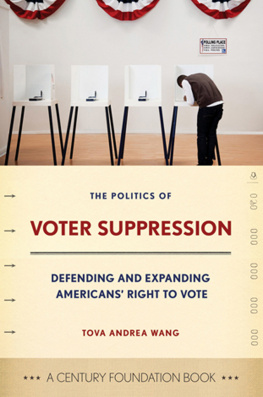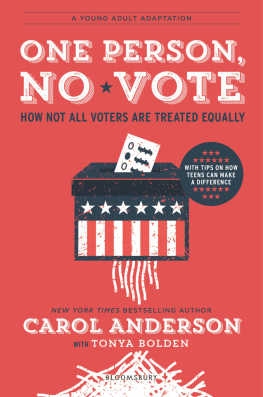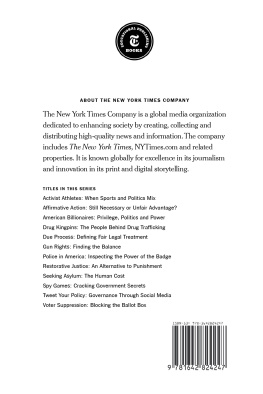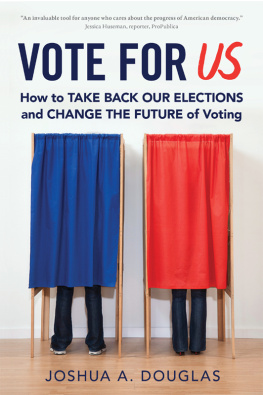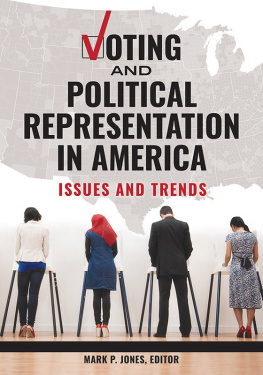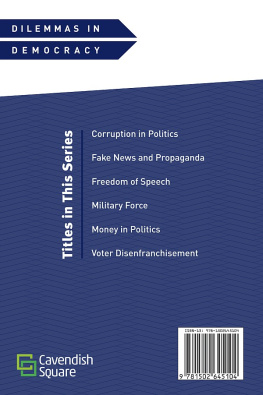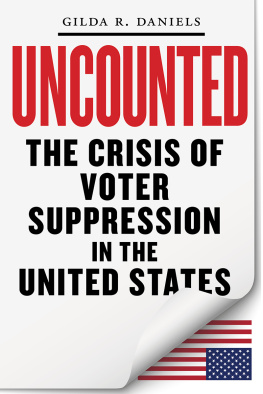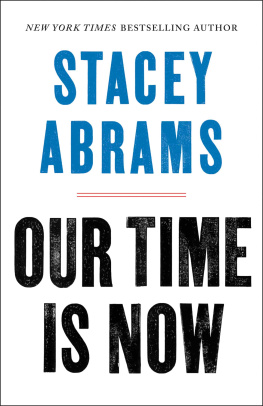FOREWORD
The right to vote is at the heart of American ideals of democracy. The U.S. Constitution places the election of representatives firmly in the hands of the People, and its amendments enumerate the many ways in which this right to vote cannot be denied. Access to the ballot by American voters not only has been protected; it also has been greatly expanded. U.S. history has been, generally, a tale of increasing suffrage, with the Fifteenth and Nineteenth amendments extending the franchise to blacks and women, respectively.
While the nations watershed moments have seen numerous hands in Congress raised in support of increasing voting rights, at other times, there have been much less distinguished efforts to claw back these rights. As Tova Wang details in The Politics of Voter Suppression , there have been many attempts by members of all political parties to restrict the right to vote throughout American history, typically in ways that satisfy purely partisan aims. And what is particularly distressing is that voter suppression is not just a relic of the past but rather continues today under the guise of election reform. Wang argues that reforms that increase participation are nearly always legitimate, while activities that suppress voting are almost never legitimate.
In todays political and economic climate, voter suppression should not be viewed as a trivial matter, particularly when it is aimed at Americans whose voices are often ignored, such as the poor, minorities, and the young. As recent elections have shown, nationwide outcomes can hinge on vote numbers in the thousands, so even modest attempts to deny voters access to the ballot can result in a change in direction for the nation. But perhaps more important, the denial of someones ability to vote is, in itself, a violation of that persons rights and a harm to our democracy, even if it does not change the outcome of an election. It is estimated that legislation enacted in the past year alonerequiring voter identification, making it harder to register or use early or absentee voting, and so onmay make it more difficult for millions of Americans to cast their votes. These laws restricting access to the ballot are very disturbing, particularly as they occur against the backdrop of an equally distressing change in campaign finance law, the U.S. Supreme Courts 2010 ruling in Citizens United v. Federal Election Commission, which removed any limits on private contributions to political action committees (PACs). This sudden reversal of the nations progress in striving toward full electoral participation, combined with the Courts huge boost to private money in political campaigns, significantly tilts the political playing field in favor of the wealthy, the powerful, and the connected.
With over a decade of experience covering voting and election issues as The Century Foundations democracy fellow, Wang is uniquely qualified to present this perspective. In 2001 she was staff person to the National Commission on Federal Election Reform, co-chaired by former presidents Jimmy Carter and Gerald R. Ford, of which The Century Foundation was a cosponsor. Tasked with making recommendations to Congress for improving the nations election process, the commission released its report, To Assure Pride and Confidence in the Electoral Process, in 2001. The following year, Congress passed the Help America Vote Act, which built on the recommendations made by the commission. Wang was the executive director of The Century Foundations Post-2004 Election Reform Working Group, composed of many of the most preeminent election law scholars in the country, which released their report, Balancing Access and Integrity, in 2005. She is also coauthor of the widely remarked upon 2006 report on voter fraud and voter intimidation for the U.S. Election Assistance Commission.
Tova Wangs work for The Century Foundation builds on its long history of looking at voting and election issues. For over a quarter century, the foundation has examined the problems with campaign finance, with publications such as What Price PACS? , the report of its Task Force on Political Action Committees (1984); Anthony Corrados Paying for Presidents: Public Financing in National Elections (1993); and the more recent volume of essays, Money, Politics, and the Constitution: Beyond Citizens United, edited by Monica Youn and cosponsored by the Brennan Center for Justice at the NYU School of Law (2011).
Wangs argument in The Politics of Voter Suppression probably will be perceived as controversial, but it should not be. While her criticism of current efforts to manipulate election reform to partisan advantage is leveled mainly at one side of the aisle, it is based on a bedrock assumption of American democracy: that an Americans right to vote shall not be denied, but rather full voter participation should be supported by the efforts of the government and of all political parties. On behalf of the Trustees of The Century Foundation, I thank Tova Wang for her work on this important issue.
Janice Nittoli, President
The Century Foundation
April 2012
PREFACE
No single American political party has cornered the market on dirty tricks. Across our countrys history, all political partiesfrom the Whigs to the Democrats to the Republicanshave abused voting laws, procedures, and reforms to suit their own narrow political ends. My concern here is with how election reforms have been used to partisan ends and, critically, how those reforms have often been used to skew and diminish voter participation across the United States. What is needed now is a new reform plan that works through the partisan election system yet results in achieving the overriding American agenda of participatory and representative government.
The time-tested strategy of party operatives for both the Democratic and Republican parties has been to make a vague or dramatically overstated claim about voter fraud and then demand the system be cleaned up through reform. Very often, the reform method chosen by those in power is a change in voting practice that is unlikely to reduce fraud but will make it harder for some segments of society to votepopulations, not coincidentally, expected to vote for political opponents. At other times, well-intentioned reforms that had a real chance to do some good are subsequently manipulated by one party or another so as to gain unfair political advantage by disenfranchising opponents.
Until the second half of the twentieth century, the Democrats were the main culprits. Over the past fifty years, however, Republicans have most frequently and deftly employed election law and procedures to help their party win elections. As the country remains ideologically divided, and outcomes of local, some statewide, and presidential elections have the potential to be close, contemporary Republicans have made it a central part of their election strategy to enact laws and call for practices that will reduce turnout among those who tend to vote Democratic, at least at the marginswhere elections can often be won or lost.
In this book I establish a new framework for analyzing election laws and policies and examine the history of election manipulation through this paradigm. I will look at election reforms for partisan advantage from the 1800s to recent timesrevealing the alarmingly common use of these tactics today and how the strategies employed to suppress voting in recent times are not novel but build on the strategies used by a variety of actors across more than a century. Political abuses of election reform are a continuousif admittedly ignoblefeature of American history. This long history of abuse should not, however, lead to political passivity and indifference; it also is possible to pursue reforms that can enhance democracy. Indeed, a key element of this book is the proposal of a number of legitimate and positive reforms that ought to be pursued as a major part of each partys agenda. Legitimate election reform will increase the number of voters who come out to vote in a partys favor. This is a more democratic and beneficial way to win elections. It is also a way to pursue partisan ends without undermining the very participatory basis of representative government.

